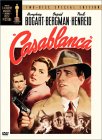Woody Allen's Other Works
Books, essays, scripts, plays
News & Website Updates
Shop for juicers at
BetterJuice.Com
Influential Films:
Front Page - Movies - CasablancaTrivia from Casablanca
- Studio publicity in 1941 claimed that Ronald Reagan and Ann Sheridan were scheduled to appear in Casablanca, and 'Dennis Morgan' is mentioned as the third lead. But this was never the case and the false story was planted, either by a studio publicist or a press agent for the three other actors, to keep their names in the press. Meanwhile George Raft was angling for the part with Jack L. Warner, but Hal Wallis had been assigned to search for what would be Humphrey Bogart's next starring role. He wrote to Jack Warner that he had found the next movie for Bogart and that the role was perfect for him. Nobody else was ever considered for the part.
- French actress Michele Morgan asked for $55,000 for appearing in the movie, but Wallis refused to pay it when he could get Ingrid Bergman for $25,000. Bergman was available only because she had been rejected for 1943's For Whom the Bell Tolls.
- Producer Hal B. Wallis considered Hedy Lamarr for the role of Ilsa, but she was then under contract to MGM, who wouldn't release her. Lamarr didn't want to work with an unfinished script anyway. Lamarr later portrayed Ilsa in a 1944 radio show based on movie scripts, "Lux Radio Theater." At the time, both Bergman and Bogart were overseas entertaining the troops. Rick was played on radio by actor Alan Ladd.
- Producer Hal B. Wallis nearly made the character Sam a female. Hazel Scott, Lena Horne, and Ella Fitzgerald were considered for the role.
- Paul Henreid was loaned to Warners for the role of Victor Lazlo by Selznick International pictures against his will. He was concerned that playing a secondary character would ruin his career as a leading romantic lead.
- The script for Casablanca was based on the unproduced play "Everybody Comes to Rick's." Samuel Marx of MGM wanted to offer play authors Murray Burnett and Joan Alison $5,000 for it, but his boss refused. Irene Lee of the Warner Brothers story department praised it to Jack L. Warner, who agreed to buy it for $20,000.
- Dooley Wilson (Sam) was a professional drummer who faked playing the piano. As the music was recorded at the same time as the film, the piano playing was actually a recording of a performance by Elliot Carpenter who was playing behind a curtain but who was positioned such that Dooley could watch, and copy, his hand movements.
- No one knew right up until the filming of the last scene whether Ilsa would end up with Rick or Laszlo. During the course of the picture, when Ingrid Bergman asked director Michael Curtiz with which man her character was in love, she was told to "play it in between." Since the ending was not the final scene shot, there are some scenes where she was aware of how everything would turn out, and these include the scene in the black market with Rick and the scene in the Blue Parrot where Ferrari offers the Laszlos one exit visa.
- "Rick's Café Américain" was modeled after Hotel El Minzah in Tangiers.
- The budget was so small they couldn't use a real plane in the background at the airport. Instead, it is a small cardboard cutout. To give the illusion that the plane was full-sized, the production crew used midgets to portray the crew preparing the plane for take-off.
- Director Michael Curtiz' Hungarian accent often caused confusion on the set. He asked a prop man for a "poodle" to appear in one scene. The prop man searched high and low for a poodle while the entire crew waited. He found one and presented it to Curtiz, who screamed "A poodle! A poodle of water!"
- Wallis thought of the film's last line three weeks after shooting ended, and Bogart was called back to dub it.
- Captain Renault's line "You like war. I like women." was changed from "You enjoy war. I enjoy women." in order to meet decency standards.
- Warners had intended to use German Horst Wessel's music as the main song for the Nazis, during the "battle of the anthems" sequence. However, the copyright was controlled by a German company, so Warners dropped that anthem for the lesser Die Wacht Am Rhein rather than violate the rights. An infringement would have allowed the German copyright holder on the song to prohibit the movie from being shown in any country not at war with Germany.
- After shooting, Max Steiner spoke against using "As Time Goes By" as the song identifying Rick and Ilsa, saying he would rather compose an original song in order to qualify for royalties. But Hal Wallis replied that since filming had ended, Ingrid Bergman had cut her hair very short to film For Whom the Bell Tolls at a distant locale and therefore could not re-shoot already-completed scenes that had used "As Time Goes By".
- Rumor: Many of the shadows were painted onto the set.
- The scene of Major Strasser's arrival was filmed at "Metropolitan Airport", now known as "Van Nuys Airport" in L.A.
- In the German version, the immortal line "Here's lookin' at you, kid", became, "Ich seh' Dir in die Augen, Kleines" which translates as "I look in your eyes, honey".
- Conrad Veidt, who played Major Heinrich Strasser, was very well known for his hatred of the Nazis.
- Rick never says "Play it again, Sam." He says: "You played it for her, you can play it for me. Play it!". Ilsa says "Play it, Sam. Play 'As Time Goes By"'. The line "Play it again, Sam" appears in the Marx Brothers' 1946 film A Night in Casablanca and it is the title of Woody Allen's Play It Again, Sam.
- Humphrey Bogart's wife Mayo Methot continually accused him of having an affair with Ingrid Bergman, often confronting him in his dressing room before a shot. Bogart would come onto the set in a rage.
- Many of the actors who played the Nazis were Jewish.
- The Allies invaded Casablanca in real life on 8 November 1942. As the film was not due for release until spring, studio executives suggested it be changed to incorporate the invasion. Warner objected: an invasion was a subject worth a whole film, not just an epilogue, and anyway the main story of this film demanded a pre-invasion setting. Apparently he then gave in and Wallis prepared to shoot an epilogue where Bogart and Rains hear about the invasion. But before Rains could travel to the studio for this, David O. Selznick (whose studio owned Bergman's contract) previewed the film and urged Warner to release it unaltered and as fast as possible. Warner now agreed and it premiered in New York on November 26. The film did not play in Los Angeles until its general release the following January, and hence competed against 1943 films for the Oscars.
- "As Time Goes By" was written by lifelong bachelor Herman Hupfeld and debuted in 1931's Broadway show "Everybody's Welcome", sung by Frances Williams. It had been a personal favorite of playwright and high school teacher Murray Burnett who, seven years later, visited Vienna just after the Nazis had entered.
Later, after visiting a cafe in south France where a black pianist had entertained a mixed crowd of Nazis, French and refugees, Burnett was inspired to write the melodrama "Everybody Comes To Rick's", which was optioned for production by Martin Gabel and Carly Wharton, and later, Warners. After the film's release, "As Time Goes By" stayed on radio's "Hit Parade" for 21 weeks. However, because of the coincidental musicians' union recording ban, the 1931 Rudy Vallee version became the smash hit. (It contains the rarely-sung introductory verse, not heard in the film.) Max Steiner, in a 1943 interview, admitted that the song "must have had something to attract so much attention".
- Bogart, Bergman and Henreid later reprised their roles for a radio performance of Casablanca on the CBS radio program The Screen Guild Players, a war benefit show.
- The film's success led to plans for a sequel, which was to be called Brazzaville. Ingrid Bergman was not available, so Irish beauty Geraldine Fitzgerald was considered for Ilsa before the project was killed. It was not until the late 1990s and Michael Walsh's novel "As Time Goes By" that a true sequel ever came to pass.
- To maximize profits from foreign distribution of the film, the studio suggested that any unpleasant characters other than the Nazis should also be from an enemy country, namely Italy. This is why Ugarte, Ferrari, and the dark European pickpocket are Italian.
- Several times the writers discussed having Rick leave with Lois/Ilsa, but this was always rejected. Besides, the censors would not have allowed it, since she was married to Victor Lazlo. Their major problem was to make it plausible that despite clearly loving Rick she would leave with Victor; the final scene was rewritten many times until this was achieved.
- When shooting Strasser (Conrad Veidt), Bogart ad libbed the line "All right, Major, you asked for it". But Wallis pointed out that this made it look as though when Strasser drew his gun first it was self-defense. Veidt was recalled and the scene reshot without the added line, but the original version was used in the trailer for the movie.
- It was claimed when the movie was in release that Jack Benny can be seen briefly in it.
- The last line is one of the most misquoted lines in all of film history. The correct line is "Louie, I think this is the beginning of a beautiful friendship." It has been quoted as "This could be the beginning of a beautiful friendship" or "I think this is the start of a beautiful friendship."
- Joy Page, who played the young Bulgarian wife, was the stepdaughter of studio head Jack L. Warner. She, Bogart, and Dooley Wilson were the only American-born people in the credited cast.
- Renault tells Rick he knows that he ran guns to Ethiopia, referring to Italy's invasion in 1935. In the Italian version of the picture, Renault's line became "You ran guns to China".
- The French dialogue between Yvonne and the French officer translates as:
French Officer: Hey you, you're not French to go out with a German like that!
Yvonne: What are you butting in for?
French Officer: I am butting in...
Yvonne: It's none of your business!- Around nine minutes into the movie, Rick ok's a credit slip dated 2-Dec-1941.







